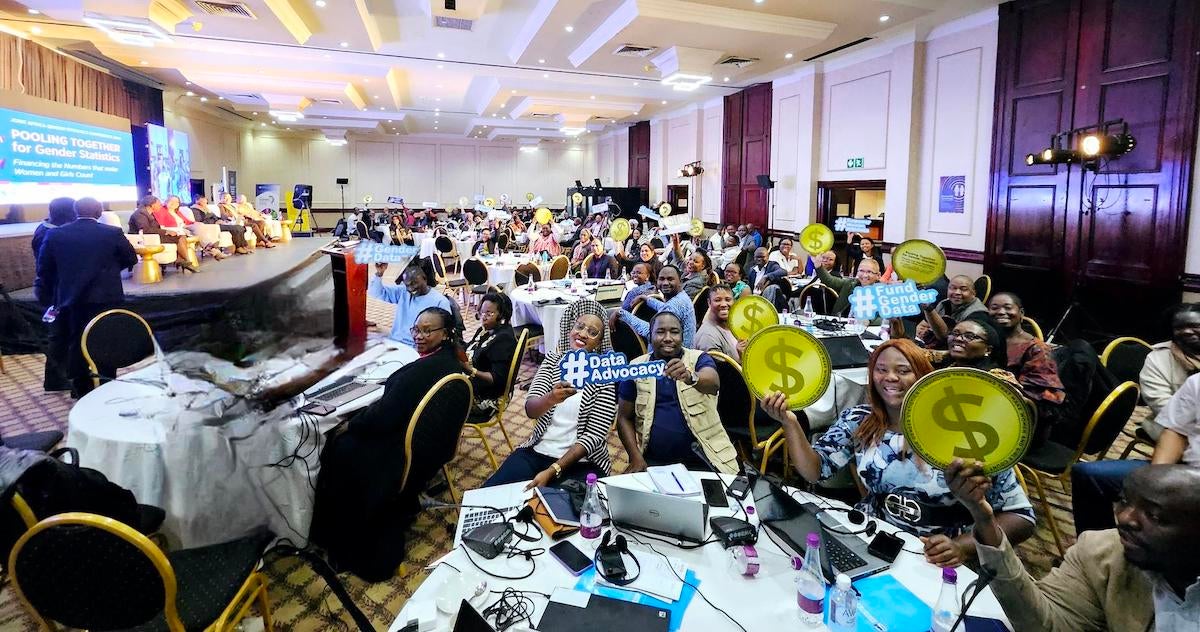Can more coordination, local ownership, and strategic communication deliver much-needed funding for gender data?
Date:

Africa needs an additional $800 million every year towards meeting the SDGs; part of this money should go towards funding gender statistics both for sustainable development and to forge forward towards gender equality and women's empowerment (GEWE).
This was one of the key messages from the 2024 Africa Gender Statistics Forum (AGSF24) held in Gaborone, Botswana in July. UN Women, SADC, ECA, and AfDB co-hosted more than 130 experts from 40 African countries with Statistics Botswana, the country's national statistics office (NSO) at the continental forum under the theme Pooling Together for Gender Statistics: Financing the Numbers that make Women and Girls Count.
Widely considered the most important annual meeting of producers and users of gender statistics in Africa, this year's AGSF emphasized the need for improved coordination between governments and NSOs in the Beijing +30 review−the thirtieth anniversary of the Fourth World Conference on Women and adoption of the Beijing Declaration and Platform for Action (1995).
“It is important that we strategically integrate gender statistics into multisectoral projects in global priority areas such as health and the environment,” said Sarah Razafindramanana, Resource Mobilization and Partnerships Specialist at UN Women West and Central Africa Regional Office.
“This will help to better leverage increasingly scarce financing for gender data and statistics in these and other critical areas,” said Razafindramanana.
Delegates underscored the pressing need for governments and other stakeholders on the continent to increase their focus on building diverse partnerships, including with innovative private sector and academic sector entities, to enhance financing for gender statistics as an integral pillar of sustainable development.
This is even more crucial in the context of growing competing demands for development financing in the COVID-19 recovery phase, and in light of climate change and conflict-related shocks in recent years. These have significantly strained available resources and shifted funding priorities.
“Only five donors make up 70 per cent of total flows for gender data globally,” said Meriem Ait Ouyahia, Coordinator of the Gender Data Network (GDN) based at the Partnership in Statistics for Development in the 21st Century, or PARIS21, and the Organisation for Economic Co-operation and Development (OECD).
“This makes the gender data sector very vulnerable to shocks or shifting donor priorities,” said Ouyahia.
In light of this, AGSF24 underscored the need to venture beyond international development funding to mobilize and secure resources domestically. While there has been a steady, albeit slow, rise in overall funding for data in Africa over the years, this has not translated into funding for gender data. This phenomena is not unique to Africa and necessitates more robust efforts to ensure country ownership of gender statistics through domestic funding to ensure the sustainability of gender data interventions.
With just over five years before the Agenda 2030 deadline, much progress has been made since the launch of the SDGs. However, much more remains to be done.
For example, despite gender data being fundamental to addressing issues related to GEWE−the focus of SDG5−according to ECA's Africa Center for Statistics (ACS), to date, only a few countries have sufficient data to monitor indicators for this Goal and only about 23 per cent of data is disaggregated.
“ECA has therefore strengthened its statistics initiatives to better support the capacities of Member States,” said William Muhwava, ECA Statistics Chief speaking on behalf of the Director of the Africa Center for Statistics.
“This includes ramping up support through harnessing new technologies, including geospatial information systems, to improve data collection, processing, analysis, dissemination, and archiving, and facilitating access to national, sub-regional, and regional databases,” said Muhwava.
AGSF24 also emphasized the value of engaging with development partners not only as funders, but as strategic partners who should be involved in all elements of gender statistics.
For instance, Lesotho’s Bureau of Statistics worked with PARIS21 to cost the country’s second National Strategy for the Development of. Statistics NSDS-II.
“This has allowed senior management of the line ministry to prepare a strategy to develop funding proposals and concepts for diverse strategic partners,” said Lehlohonolo Takalimane, a senior statistician and Head of Gender and Health Statistics Section at Lesotho’s Bureau of Statistics.
“The partnership has been successful,” said Takalimane.
AGSF24 stressed that strategically engaging with a broad range of development partners should also include the crucial, yet often neglected, area of strategic communication of gender data. This was emphasized during the launch of the joint UN Women-GROOTS Kenya regional toolkit on the uptake and use of gender data, which took place during the AGSF.
Strategic communication and joint advocacy are important in ensuring that new and existing gender data is accessible and can serve its ultimate purpose−to influence and inform policies and decisions that will improve the lives of women and girls.